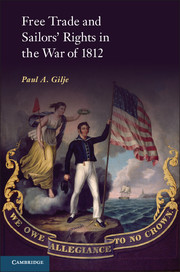18 - Pursuit of Peace
Published online by Cambridge University Press: 05 March 2013
Summary
No sooner had the United States declared war than President James Madison began his pursuit of peace. At first the conditions for ending hostilities were clear and linked to two simple demands that would soon be encapsulated in Porter's slogan of free trade and sailors' rights: protection of American neutral commerce and the end of impressment. With the British repeal of the orders in council, only one essential condition had to be dealt with – impressment. Although Jefferson had earlier sidestepped the issue, both the Americans and the British considered it vital to their national identity. The American support for “brother citizens” forced to serve in the British navy, combined with the British belief in their right to search American ships for British seamen, created an insurmountable barrier to peace in the first two years of the war. The British remained intractable on the issue, even as Madison began to show some flexibility and was willing to prohibit British subjects from serving on American merchant and naval vessels. Part of the problem with the argument over impressment was that it reflected two different definitions of citizenship: Americans believed that a seaman could choose his own allegiance, while the British thought that allegience to the British crown could never be lost. Those definitions came into bold relief in a conflict over the treatment of prisoners of war and the contrast between how the British perceived naturalized American citizens born in Great Britain and fighting for the United States, and impressed Americans serving in his majesty's navy. Only when impressment receded could peace be established. Eager for an honorable way out of the war, Madison quickly accepted a Russian offer to mediate in early 1813, but clung to the demand for an end of impressment. The British rejected the Russian intervention, but eventually agreed to direct negotiations. By the time the British and American commissioners met in Ghent in the summer of 1814 to discuss terms, the larger geopolitical situation had changed. In Europe, Napoleon had been defeated, allowing the British to devote more men and resources to the American war. In North America, repeated American invasions of Canada had come to naught, and the British were preparing to launch an all-out assault on the United States that threatened to tear the nation apart.
- Type
- Chapter
- Information
- Free Trade and Sailors' Rights in the War of 1812 , pp. 244 - 261Publisher: Cambridge University PressPrint publication year: 2013



